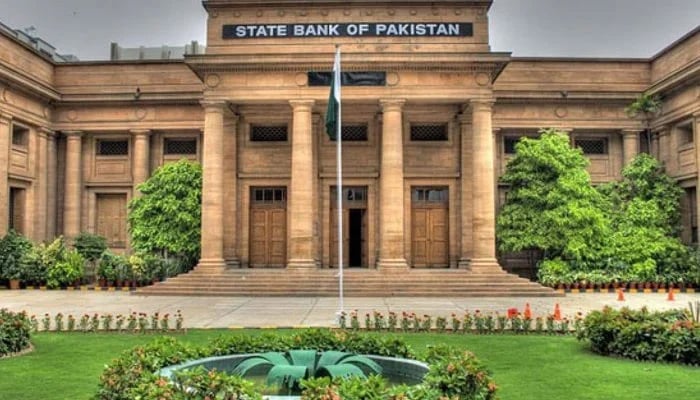Data to continue to be basis for monetary policy decisions: SBP governor report
KARACHI: The State Bank of Pakistan (SBP) will continue to follow a data-dependent approach for making monetary policy decisions as any uncertainty surrounding the global commodity prices and other shocks may affect the country’s inflation target, its report said on Friday.
According to the Governor’s Annual Report (GAR) for fiscal year 2022–2023 released by the SBP, the impact of contractionary monetary policy, improvements in domestic supplies, softer non-energy global commodity prices and the high base effect will cause average inflation to moderate to 20-22 percent in the current fiscal year.
Because of its tight monetary policy, the SBP is optimistic that price pressures will ease this fiscal year compared to last year. To counteract the rapidly rising inflation, it increased the policy rate by 600 basis points, rising from 16 percent in December 2022 to a record-high 22 percent in June 2023.
Despite forecasts from the World Bank and International Monetary Fund indicating 26.5 percent and 23.6 percent, respectively, for the average headline national consumer price index inflation in FY24, the central bank has stuck to its 20-22 percent inflation projection for the fiscal year since July.
The growing optimism that inflation will fall boosted expectations of rate cuts coming sooner, possibly in March 2024.
“In view of the uncertainties over the path of global commodity prices, above target inflation in most advanced economies and its potential impacts on global financial conditions, and Pakistan’s susceptibility to shocks, the SBP will continue with its data-dependent approach to calibrate monetary policy decisions to respond to changing near-term inflation target,” the report said.
“Accordingly, under the fourth Strategic Plan — Vision 2028, the SBP plans to further strengthen its analytical and forecasting capabilities including a deeper understanding of monetary policy transmission and medium-term inflation forecasts,” it added.
The inflation surged to 29.2 percent in FY23 around the upper bound of the SBP’s revised inflation projection range of 27.0 – 29.0 percent for FY23, the SBP Governor Jameel Ahmad said in his report.
This was in line with multi-decade-high inflation in most advanced and emerging economies that maintained an aggressive monetary policy stance, he added.
The central bank will continue to make decisions to prevent high inflation from becoming entrenched and keep inflation expectations anchored to achieve the medium-term target of 5-7 percent by the end of FY25, said the report.
However, this outlook hinges on the absence of adverse shocks stemming from geo-political tensions and unforeseen climate events, and unfavorable movements in global commodity prices.
The report acknowledges the central bank’s responsibility of achieving and maintaining price stability while also emphasizing the role of fiscal policy and effective administration for price and financial stability, particularly rationalisation of government spending, increasing revenue collection, strengthening food and energy supply chains and enhancing productivity.
The report also notes that political uncertainty weighed on business and consumer sentiments, and thus on economic activity. Real GDP contracted by 0.2 percent, and budgetary targets for the government’s fiscal and primary balances were missed by large margins amid less-than-planned tax revenues and lower than budgeted reduction in subsidies. This was despite notable, albeit delayed, fiscal policy measures in the second half of the year, the report said.
-
 Prince William Closes Saudi Arabia Visit With Rare Desert Shot
Prince William Closes Saudi Arabia Visit With Rare Desert Shot -
 'King Charles Acts Fast Or Existential Crisis' Over Andrew Scandal
'King Charles Acts Fast Or Existential Crisis' Over Andrew Scandal -
 Brooklyn Beckham Charging Nearly £300 In Ticket Cost For Burger Festival
Brooklyn Beckham Charging Nearly £300 In Ticket Cost For Burger Festival -
 Prince William Makes Unexpected Stop At Local Market In Saudi Arabia
Prince William Makes Unexpected Stop At Local Market In Saudi Arabia -
 Zayn Malik Shares Important Update About His Love Life
Zayn Malik Shares Important Update About His Love Life -
 Kate Middleton, William Are Holding Onto Their Hats As Worse Gets Threatened: Behind The Veil Of Shame
Kate Middleton, William Are Holding Onto Their Hats As Worse Gets Threatened: Behind The Veil Of Shame -
 British Soap Awards Scrapped Again As ITV Confirms 2026 Hiatus
British Soap Awards Scrapped Again As ITV Confirms 2026 Hiatus -
 Climate Nearing Dangerous Tipping Points, Study Shows
Climate Nearing Dangerous Tipping Points, Study Shows -
 James Van Der Beek, 'Dawson's Creek' Star, Dies At 48
James Van Der Beek, 'Dawson's Creek' Star, Dies At 48 -
 Threads Launches Dear Algo AI Feature To Personalise Feeds In Real Time
Threads Launches Dear Algo AI Feature To Personalise Feeds In Real Time -
 Police Take Action Over Andrew's Ties With Jeffrey Epstein While In UK Office
Police Take Action Over Andrew's Ties With Jeffrey Epstein While In UK Office -
 Courtney Love Makes First Appearance Since New Report On Kurt Cobain's Death
Courtney Love Makes First Appearance Since New Report On Kurt Cobain's Death -
 King Charles Anxious As Uncertainty Grows Over Sarah Ferguson’s Next Move
King Charles Anxious As Uncertainty Grows Over Sarah Ferguson’s Next Move -
 Real Reason Kim Kardashian Is Dating Lewis Hamilton
Real Reason Kim Kardashian Is Dating Lewis Hamilton -
 Rihanna Leaves Elderly Woman Star-struck In Viral Grocery Store Video
Rihanna Leaves Elderly Woman Star-struck In Viral Grocery Store Video -
 TikTok US Launches Local Feed Using Precise Location Data
TikTok US Launches Local Feed Using Precise Location Data




